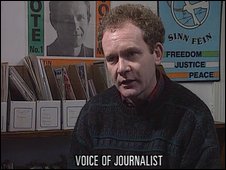Sep 28, 2009
Irish News: Martin McGuinness
 Stature of ten men unassailed
Stature of ten men unassailed
THE HUNGER STRIKE
By Martin McGuinness
28/09/09
THROUGHOUT Irish history Britain attempted to legitimise its actions by criminalising those native forces who opposed them physically, or in conscience. At one time it was Catholicism which was penalised, later it was nationalism and republicanism.
After 1969 the prison population here multiplied, not from an outbreak of criminality but due to the failure of government, street resistance and, latterly, IRA activity.
The first British secretary of state, William Whitelaw, recognised this political reality within the rising prison population and granted special category status (that is, political status) as a result of a republican hunger strike in 1972 before any prisoner lost his life.
Although tensions remained and republicans continued to attempt to escape and thwart imprisonment, by and large a quid pro quo existed within the jails. No prison officer, in those days, lost his life.
All this changed when the British went for wholesale confrontation and picked on what they mistakenly thought was the most vulnerable section of the republican movement – our imprisoned comrades.
They arbitrarily ended political status on March 1 1976, declaring that anyone involved in physical force after that date was a criminal.
But they had several problems, not least that IRA volunteers were politically and community motivated and, unlike loyalists, would not accept the Orwellian dispensation.
Britain’s other ‘criminalisation’ difficulty was that their own laws recognised IRA activities as ‘the use of violence for political ends’.
As we know, emboldened by the sacrifices of the hunger strikers, the H-Block prisoners went on to establish full political status, eventually acknowledged in the early release of prisoners under the terms of the Good Friday Agreement.
Some weeks ago Gerry Adams met with all but two of the families of the hunger strikers. Bridie Lynch, sister of Kevin, couldn’t make the meeting but telephoned her solidarity for the group.
The meeting was private though later misrepresented by others. It was the first time that many of the families had met since those heart-rending seven months in 1981.
The allegation that a ‘deal’ by the Sinn Fein leadership was squandered was given short shrift. The families appealed to those who were perpetuating their ongoing grief to cease, though they have persisted, motivated by a variety of reasons.
In 1981 we were dealing with a ruthless, hypocritical enemy, personified by Margaret Thatcher. I find it quite ironic that in their desire to get at Sinn Fein our opponents are attempting to portray Thatcher as someone anxious to resolve the Hunger Strike.
Nothing could be further from the truth. According to our critics, the hunger strikers, on whose behalf we were acting, should have accepted an ‘offer’ which came to the prisoners and us, via a phone-call from a British official in London, through the intermediary (since identified as Brendan Duddy – an honourable man), to myself, to a phone-call to Gerry Adams, and in a verbal message to Danny Morrison to the prisoners.
Clearly, they have chosen to forget of what mettle the hunger strikers were made, of their experiences of British deceit in December 1980.
Sinn Fein had political and ideological differences with the Irish Commission for Justice and Peace (ICJP).
We and the prisoners suspected that it would sell the prisoners short. Despite being a vehicle for the British government delivering a compromise and avoiding direct negotiations, even the ICJP’s expectations/demands that the British would send in someone to stand over what London was implying in messages was refused six times in the hours before Joe McDonnell died.
This year the British government selectively released documents about this period under the Freedom of Information Act and our critics have seized upon their release, but not their content, as some sort of proof.
That the republican leadership was in contact with the British was revealed long ago, not least in the 1987 book Ten Men Dead.
I would encourage people to read this book and the documents released in 2009 and compare it to the allegations of those who never visited the hunger strikers in the prison hospital, never dealt with the prison administration and the British government or liaised with the ICJP (which, on its terms, to be fair, was attempting to resolve the situation).
Out of the five demands the only thing the British were offering to the hunger strikers after four men had died was that they could wear ordinary clothes, “provided these clothes were approved by the prison authorities.”
The prisoners would have to do prison work or else they would be ‘punished by loss of remission, or some similar penalty’.
Ironically, Thatcher was without human compassion until her own son, Mark, was lost in the Sahara desert during a car rally in 1982 and as a mother begged God to deliver her son from hunger and thirst in the desert. Mark Thatcher was saved but not our 10 men dead. Nevertheless, their stature is unassailable and increases with every passing year, those men whose memory we will always honour, whose sacrifice triggered such a confidence in the nationalist community that things were changed utterly.
 It has withstood the blows of a million years, and will do so to the end.
It has withstood the blows of a million years, and will do so to the end.
[…] Irish News: Martin McGuinness […]
[…] interview (as they got with former Taoiseach Fitzgerald). Instead, they were eventually given an article from Martin McGuinness. Once the issue ran, it was rumoured that Adams wanted his spake in. Nothing has been published […]